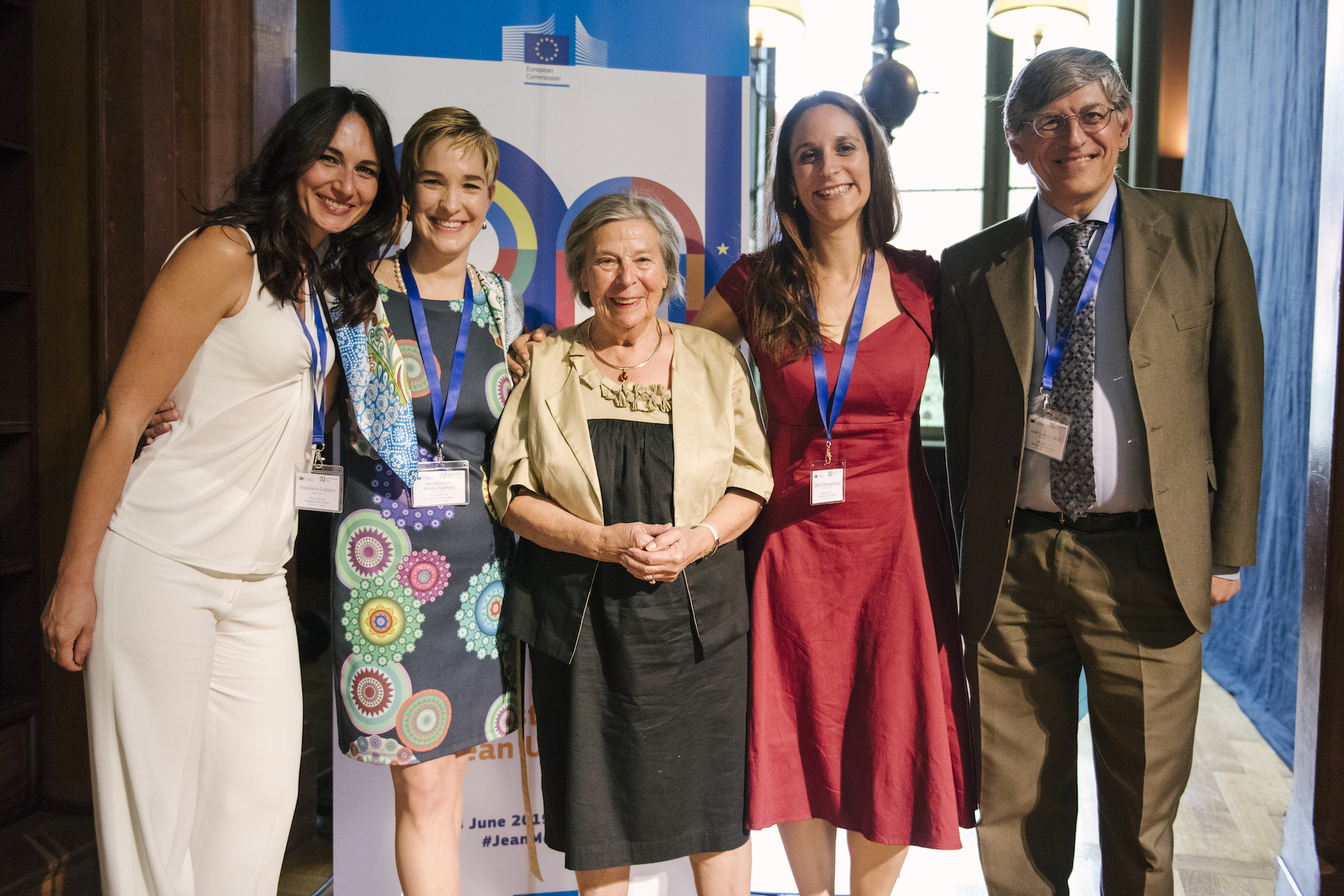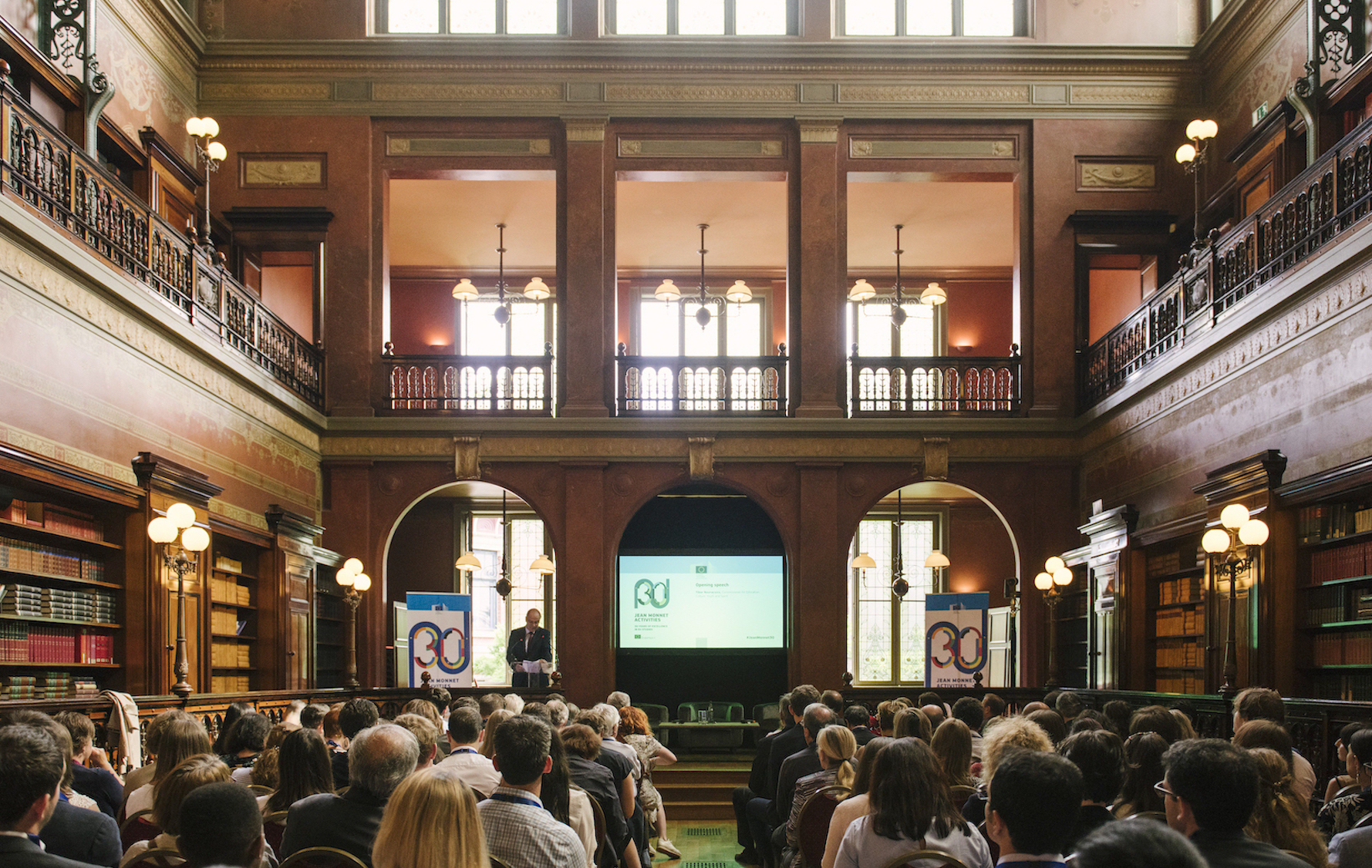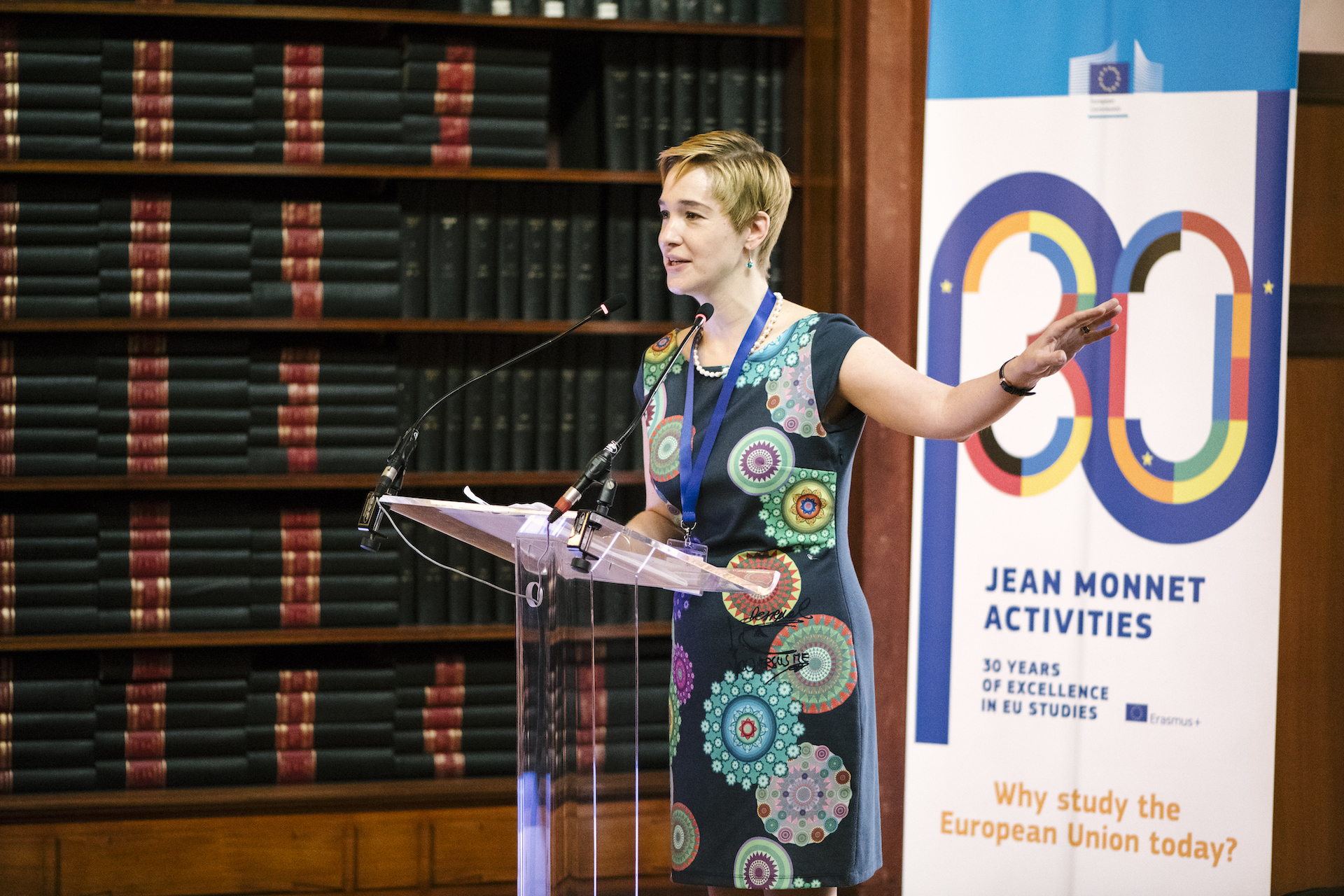 Anniversaries are tricky. Are they conveniently round numbers? A knee-jerk reaction to hastily improving the visibility of a given project or person? Or long-awaited occasions to mark the passing of one generation and the new perspectives of others? Possibly all three.
Anniversaries are tricky. Are they conveniently round numbers? A knee-jerk reaction to hastily improving the visibility of a given project or person? Or long-awaited occasions to mark the passing of one generation and the new perspectives of others? Possibly all three.
In the case of the Jean Monnet activities, 2019 is a grand opportunity to assess the sheer impact of three decades of teaching and learning on EU affairs has wrought on the minds of European youth, and those far beyond Europe’s shores. With key events in Brussels and Florence, and dozens and dozens more around the world, DG EAC have laboured long and hard to make 2019 something to shout about. We’ll see a few more exciting events yet, as 2019 rolls on, but I wanted to pay tribute to their hard work, as well as the legacy-builders themselves who were present at the 18 June event in Brussels’ magnificent Bibliothèque Solvay. There’s something reassuringly cool and scholastic about great walls of books on either side, blossoming ceiling-wards. I’ve no doubt Monnet himself would have approved the venue.
Setting the Stage
The programme was divided into five parts: three academic panels, one social media section, and an opening discussion. It was a privilege to welcome everyone to these grand surroundings, and to invite the Commissioner for Education, Culture, Youth and Sport, Mr Tibor Navracsics to launch the event. The Commissioner stated that Jean Monnet activities demonstrate their impact through simple but effective engagement with students, the sheer enthusiasm of the university staff, and the inspiration lodged within the activities themselves. The challenge now was to see post-2019 activities expand still further, engaging schools, civil society, policy-makers as ‘Monnet multipliers’… engaging with specific initiatives like the Spinelli Awards or broader structures like the European Education Area and European Universities Initiative. A prospective doubling of the budget means ensuring the Jean Monnet activities remain fit for purpose, and unflagging in their ability to operate on a bedrock of excellence.
Pioneers, oh (Jean Monnet) Pioneers
The Commissioner then invited to the stage two Jean Monnet pioneers key to the establishment of the entire Jean Monnet project. The first was Jacqueline Lastenouse-Bury, Honorary Director of the European Commission and the creator and founder not only of the JM Activities themselves, but who, in an inspired choice, badged them as ‘Jean Monnet’ projects. With enthusiasm and determination, Jacqueline commented on the flowers she’d received from the Commissioner, declaring that the best things in life were alive, varied and fundamental… including education. She explained her goal of raising the visibility of academic Chairs via a new structure of European studies, the quick response of the Commission, the personal support by President Jacques Delors himself, and the way in which JM activities have become and interface between the Commission and academia in a way that has transformed EU education policy.
It was a privilege to hear the formative moments of the Jean Monnet programme explained so intimately by Jacqueline herself. Bart De Schutter, Senior Advisor and former Rector of the Vrije Universiteit Brussel, and a key part of getting Jean Monnet Chairs institutionalised, spoke clearly about the ‘tsunami of enthusiasm’ with which Jean Monnet activities have been received across the years, as well as the role that later Modules and Centres of Excellence played in boosting EU scholarship more broadly. Bart made a point that became an hourly refrain: that EU studies are, and must remain, inter-disciplinary to capture the full richness of all that comprises the study of the EU. A key theme that stayed with me from both our pioneers was the sheer value of the Jean Monnet activities: they sensed this from the very beginning, and now in 2019 we as JM practitioners can see the very real ‘return on investment’ yielded by their inspiration, and our various labours.
We’ve invested in 30 years’ worth of education, labouring to make use of our own expertise and build it in others, exploring the classics of EU integration while constructing a reservoir of critical thinking. Both of these streams are, I’m sure, of inestimable value to the European Commission, relying on JM pioneers and activists alike to brainstorm new ideas, suggest new projects, as well as push the need to keep alive the dialogue between EU institutions on the one side, and European and global academia on the other. This dialogue is, after all, exactly how Jean Monnet activities began in the first place!
EU Studies: Critical Junctures and Future Paths
I moderated the 11am panel that followed Jacqueline and Bart’s tour d’horizon, joined by Didier Georgakakis from University Paris 1, Olivier Costa from the College of Europe’s Bruges campus, and Elisabeth Weisswange, a College of Europe alumnus and member of European Horizons think tank. Didier suggested that EU studies remains relevant and fascinating simply because EU integration itself is incomplete, and ever-changing. Studies of the EU must remain comparative, unashamedly critical where necessary, and involve more vocational inputs including boosting doctoral studies. Olivier suggested a ‘locational logic’, exploring the ways in which Europe itself generated theories, from policy of crisis to the need for adaptability, from differing pedagogic approaches to the ideal academic ‘tone’ as tolerant and engaging, rather than preachy or pontificating.
Elisabeth then invited us to consider the difference between EU and European studies, and to think of the overlapping societal, career-based and personal components that affect young scholars in their desire to study the EU. In response to the lively Q&A, the panel agreed that comparative, regional and global dimensions need to feature more heavily, along with enhanced conceptual rigor of key terms. I came away from this panel more convinced than ever that academics need to remain unafraid to tackle tough topics, and that JM activities are themselves entirely suited to the task of supporting critical thinking. Critical theory, deconstructionist approaches on the whole gamut of EU integration, from the Eurozone to Brexit, from Euroscepticism to citizenship needs to be refined by robust and contemporary critique, not just the convenient reiteration of familiar leitmotifs. Doing so will keep the research fresh, and their application useful.
Innovative Jean Monnet Practices
Andras Baneth, Managing Director of the Public Affairs Council’s European office moderated the next panel on contemporary JM developments, joined by Alberto Alemmano from Ecole des Hautes Etudes Commerciales, Paris, Jose Martinez-Sierra from Harvard University, and Andrea Bertolini, from the Dirpolis Institute, in Pisa, Italy. All four spoke compellingly about the need for JM activities to push the boundaries, maintain a spirit of intellectual curiosity about the EU, and be unafraid to establish new modes of teaching, research, and especially outreach, based on a better idea of ‘who’ Europe is, as an audience. Who, in Europe, is listening? What do they need to hear?
Alberto highlighted the casual way in which key tenets of EU law, including Schengen, are routinely misunderstood, even breached, and the need to teach and challenge, as necessary. The debate moved from the role of academics as ‘active’ or ‘activists’ to the balance between academic rigor, and social relevance. The latter is a particularly tricky act, I’ve found. Unrelenting rigor is a scholastic must, yet not suitable for every audience; relevance can be an easy by-product of a topic area, or a real struggle, when demonstrating the non-tangible value of a given idea. This suggests that as academics, particularly Jean Monnet practitioners, we need to remember our audience, as well as our context. Being an EU citizen is a complicated business: there are pedagogic obligations upon us to explain the legal rights that others enjoy. We need to continue to explain, define, outline, critique. And in doing so, reaffirm and recreate: a dynamic that Monnet himself would have approved, insisting as he did that “Europe has never existed; one must genuinely create Europe”.
Such obligations take a lifetime to understand, whether one is learning or teaching them. This suggests starting early in the life of EU citizens: from junior and high school opportunities, on to vocational, educational, and mobility-based initiatives, right through to lifelong learning structures. It sounds ambitious. But there is real scope here for post-2020 Jean Monnet projects to be crafted to span the lifetime of EU citizens, making them less institution-specific and more ‘genuinely generational’. Visible, trustworthy , useful Jean Monnet projects can and should enable current and future EU citizens to know, reflect on and further refine their rights, opportunities and freedoms. Failing to provide these opportunities leaves EU citizens unclear, unsure, and susceptible to all manner of reductivist narratives.
JeanMonnet30 Unplugged
The post-lunch part of the afternoon (always a dangerous spot) was hugely enlivened by Rosie Birchard, DG EAC’s social media czarina, who walked the audience through the huge range of inter-linked platforms now used by DG EAC in reaching out to key JM teachers and students around the world. She gave us a whistlestop tour of the various activities on virtually every continent that had produced a JeanMonnet30 event in the past year. She was joined by enthusiastic students, who gave truly moving testimonies of how involvement in various JM activities had affected their scholarship, career development, and opportunities within and on behalf of the EU. I felt nostalgic for my own classroom and students at this point, and started mulling over ways in which to boost the digital content of my teaching to link into these vibrant new platforms.
To boldly go (where no Monnet has gone before)…
Alberto Alemanno moved from panellist to moderator, joined in this final panel by a truly international crew, including the redoubtable Brigid Laffan, Director of the Robert Schuman Centre for Advanced Studies at the European University Institute in Florence, Allyson Delnore from the University of Pittsburgh, US, and Jean Monnet’s answer to the Entente Cordial: Jean-Marc Trouille, from the University of Bradford. All three spoke personally and effectively about their own impressions of where JM activities could feasibly go in the decades to come. Allyson pushed the need for greater JM contributions to current policy-making, as well as remaining commendably comparative in form. Jean-Marc argued passionately that enhanced support for JM activities would be ideally located in the African region. Here, the content of JM activities could boost teaching on the EU, while their overall form could be applied as a regional template to better study Africa itself (perhaps a new suite of ‘Nelson Mandela Activities’?). Brigid reflected clearly on the frequently unacknowledged normative preferences of what the EU ‘ought’ to be vs. the profound need for evidence-based critique; concluding with a reminder to ask continually ‘what kind of polity’ is the EU?
Value, Vision and Viability
Wrapping up the day’s themes, I suggested that alongside inter-disciplinarity, rigor and relevance comes the duty of care entrusted to Jean Monnet scholars. Jean Monnet Chairs, professors, teachers of all stripes are together ‘a trusted voice’: individuals with enormous responsibility to call out half-truths and untruths and replace them with evidence, analysis and insight on the entire integration-Euroscepticism spectrum. I concluded that my ‘Trinity of V’s’ help us appreciate both the present benefits and potential of Jean Monnet activities in terms of their value, their vision and viability. First, they possess value, and are OF value, and comprise value themselves. Second, these activities help us more clearly to see the EU, but also to see beyond it too.
Finally, Jean Monnet projects are viable because they produce inestimable tangible and intangible benefits. I was grateful to have these and other views positively echoed in the concluding remarks by Themis Christophidou, Director-General for Education, Youth, Sport and Culture. I’m also delighted to commend the incredibly hard work of DG EAC’s Eleni Chronopoulou, who has overseen these flagship events of 2019, as well as many before, with the huge energy, enthusiasm and attention to detail necessary to transform these events into life-long memories. In sum, Jean Monnet activities have, since 1989, helped us earn the Europe we deserve. Here’s to the next 30 years of scholarship (and the occasional anniversary!).


